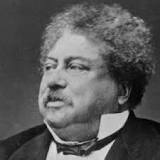The Count of Monte Cristo Page #15
The Count of Monte Cristo is an adventure novel by French author Alexandre Dumas completed in 1844. It is one of the author's most popular works, along with The Three Musketeers.
The emperor, now king of the petty Island of Elba, after having held sovereign sway over one-half of the world, counting as his subjects a small population of five or six thousand souls,—after having been accustomed to hear the “Vive Napoléons” of a hundred and twenty millions of human beings, uttered in ten different languages,—was looked upon here as a ruined man, separated forever from any fresh connection with France or claim to her throne. The magistrates freely discussed their political views; the military part of the company talked unreservedly of Moscow and Leipsic, while the women commented on the divorce of Josephine. It was not over the downfall of the man, but over the defeat of the Napoleonic idea, that they rejoiced, and in this they foresaw for themselves the bright and cheering prospect of a revivified political existence. An old man, decorated with the cross of Saint Louis, now rose and proposed the health of King Louis XVIII. It was the Marquis de Saint- Méran. This toast, recalling at once the patient exile of Hartwell and the peace-loving King of France, excited universal enthusiasm; glasses were elevated in the air à l’Anglaise, and the ladies, snatching their bouquets from their fair bosoms, strewed the table with their floral treasures. In a word, an almost poetical fervor prevailed. “Ah,” said the Marquise de Saint-Méran, a woman with a stern, forbidding eye, though still noble and distinguished in appearance, despite her fifty years—“ah, these revolutionists, who have driven us from those very possessions they afterwards purchased for a mere trifle during the Reign of Terror, would be compelled to own, were they here, that all true devotion was on our side, since we were content to follow the fortunes of a falling monarch, while they, on the contrary, made their fortune by worshipping the rising sun; yes, yes, they could not help admitting that the king, for whom we sacrificed rank, wealth, and station was truly our ‘Louis the well-beloved,’ while their wretched usurper has been, and ever will be, to them their evil genius, their ‘Napoleon the accursed.’ Am I not right, Villefort?” “I beg your pardon, madame. I really must pray you to excuse me, but—in truth—I was not attending to the conversation.” “Marquise, marquise!” interposed the old nobleman who had proposed the toast, “let the young people alone; let me tell you, on one’s wedding day there are more agreeable subjects of conversation than dry politics.” “Never mind, dearest mother,” said a young and lovely girl, with a profusion of light brown hair, and eyes that seemed to float in liquid crystal, “’tis all my fault for seizing upon M. de Villefort, so as to prevent his listening to what you said. But there—now take him—he is your own for as long as you like. M. Villefort, I beg to remind you my mother speaks to you.” “If the marquise will deign to repeat the words I but imperfectly caught, I shall be delighted to answer,” said M. de Villefort. “Never mind, Renée,” replied the marquise, with a look of tenderness that seemed out of keeping with her harsh dry features; but, however all other feelings may be withered in a woman’s nature, there is always one bright smiling spot in the desert of her heart, and that is the shrine of maternal love. “I forgive you. What I was saying, Villefort, was, that the Bonapartists had not our sincerity, enthusiasm, or devotion.” “They had, however, what supplied the place of those fine qualities,” replied the young man, “and that was fanaticism. Napoleon is the Mahomet of the West, and is worshipped by his commonplace but ambitious followers, not only as a leader and lawgiver, but also as the personification of equality.” “He!” cried the marquise: “Napoleon the type of equality! For mercy’s sake, then, what would you call Robespierre? Come, come, do not strip the latter of his just rights to bestow them on the Corsican, who, to my mind, has usurped quite enough.” 0085m “Nay, madame; I would place each of these heroes on his right pedestal—that of Robespierre on his scaffold in the Place Louis Quinze; that of Napoleon on the column of the Place Vendôme. The only difference consists in the opposite character of the equality advocated by these two men; one is the equality that elevates, the other is the equality that degrades; one brings a king within reach of the guillotine, the other elevates the people to a level with the throne. Observe,” said Villefort, smiling, “I do not mean to deny that both these men were revolutionary scoundrels, and that the 9th Thermidor and the 4th of April, in the year 1814, were lucky days for France, worthy of being gratefully remembered by every friend to monarchy and civil order; and that explains how it comes to pass that, fallen, as I trust he is forever, Napoleon has still retained a train of parasitical satellites. Still, marquise, it has been so with other usurpers—Cromwell, for instance, who was not half so bad as Napoleon, had his partisans and advocates.” “Do you know, Villefort, that you are talking in a most dreadfully revolutionary strain? But I excuse it, it is impossible to expect the son of a Girondin to be free from a small spice of the old leaven.” A deep crimson suffused the countenance of Villefort. “’Tis true, madame,” answered he, “that my father was a Girondin, but he was not among the number of those who voted for the king’s death; he was an equal sufferer with yourself during the Reign of Terror, and had well-nigh lost his head on the same scaffold on which your father perished.” “True,” replied the marquise, without wincing in the slightest degree at the tragic remembrance thus called up; “but bear in mind, if you please, that our respective parents underwent persecution and proscription from diametrically opposite principles; in proof of which I may remark, that while my family remained among the staunchest adherents of the exiled princes, your father lost no time in joining the new government; and that while the Citizen Noirtier was a Girondin, the Count Noirtier became a senator.” “Dear mother,” interposed Renée, “you know very well it was agreed that all these disagreeable reminiscences should forever be laid aside.” “Suffer me, also, madame,” replied Villefort, “to add my earnest request to Mademoiselle de Saint-Méran’s, that you will kindly allow the veil of oblivion to cover and conceal the past. What avails recrimination over matters wholly past recall? For my own part, I have laid aside even the name of my father, and altogether disown his political principles. He was—nay, probably may still be—a Bonapartist, and is called Noirtier; I, on the contrary, am a staunch royalist, and style myself de Villefort. Let what may remain of revolutionary sap exhaust itself and die away with the old trunk, and condescend only to regard the young shoot which has started up at a distance from the parent tree, without having the power, any more than the wish, to separate entirely from the stock from which it sprung.”
Translation
Translate and read this book in other languages:
Select another language:
- - Select -
- 简体中文 (Chinese - Simplified)
- 繁體中文 (Chinese - Traditional)
- Español (Spanish)
- Esperanto (Esperanto)
- 日本語 (Japanese)
- Português (Portuguese)
- Deutsch (German)
- العربية (Arabic)
- Français (French)
- Русский (Russian)
- ಕನ್ನಡ (Kannada)
- 한국어 (Korean)
- עברית (Hebrew)
- Gaeilge (Irish)
- Українська (Ukrainian)
- اردو (Urdu)
- Magyar (Hungarian)
- मानक हिन्दी (Hindi)
- Indonesia (Indonesian)
- Italiano (Italian)
- தமிழ் (Tamil)
- Türkçe (Turkish)
- తెలుగు (Telugu)
- ภาษาไทย (Thai)
- Tiếng Việt (Vietnamese)
- Čeština (Czech)
- Polski (Polish)
- Bahasa Indonesia (Indonesian)
- Românește (Romanian)
- Nederlands (Dutch)
- Ελληνικά (Greek)
- Latinum (Latin)
- Svenska (Swedish)
- Dansk (Danish)
- Suomi (Finnish)
- فارسی (Persian)
- ייִדיש (Yiddish)
- հայերեն (Armenian)
- Norsk (Norwegian)
- English (English)
Citation
Use the citation below to add this book to your bibliography:
Style:MLAChicagoAPA
"The Count of Monte Cristo Books." Literature.com. STANDS4 LLC, 2024. Web. 25 Nov. 2024. <https://www.literature.com/book/the_count_of_monte_cristo_34>.




Discuss this The Count of Monte Cristo book with the community:
Report Comment
We're doing our best to make sure our content is useful, accurate and safe.
If by any chance you spot an inappropriate comment while navigating through our website please use this form to let us know, and we'll take care of it shortly.
Attachment
You need to be logged in to favorite.
Log In